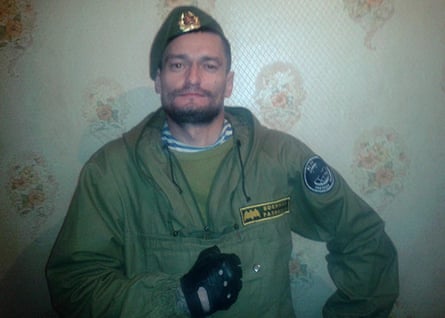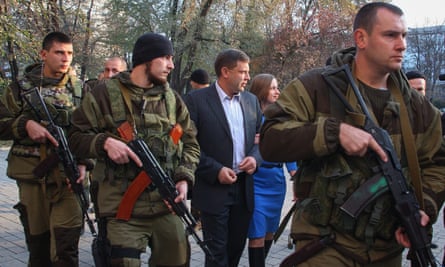Russian volunteers returning home after fighting alongside separatist rebels in eastern Ukraine say they have not received any support from the state, despite many suffering from ongoing physical and psychological problems.
Hostilities in the region officially ended in a ceasefire last year, by which time the conflict had claimed nearly 7,000 lives and left more than 17,000 wounded.
Since then Russia has turned its attention to the war in Syria, leading many separatists and their supporters accusing Moscow of “giving up” on eastern Ukraine.
The returning soldiers were not been hailed as heroes. Because Vladimir Putin had denied the presence of Russian troops across the border and refused to officially recognise the role volunteers had played, they were not entitled to official state support. fighters cannot access the support offered to army employees. Some suffered serious injuries or psychological damage and are now critical of how they’ve been treated by the government, while others say they are prepared to return to fight at any moment.
Here, men and women who fought in Donbass speak about their struggle to assimilate back into daily life:
Alexander Nelyubin

I went to the Donbass in July 2014 to defend our Russian world from attacks by the west. It was necessary to meet the enemy at our borders.
In August 2014, I swore an oath to the Donetsk People’s Republic. I served in a reconnaissance and sabotage team – the Kalmius special detachment.
At first, weapons had to be seized. Then, brand new ones began to arrive [from Russia], still coated in [protective] grease.
In the republic, there were very big problems in terms of organisation and coordination. Many were killed due to stupidity and incompetence.
I received shrapnel wounds and a severe concussion [after an attack on a small town called Yelenovka]. I was sent along with two busloads full of wounded soldiers for medical treatment in Russia, in Sevastopol.
Then we returned home and became irrelevant. The local command headquarters and I disagreed on a lot of issues.
Almost all my comrades left the field a while back. The killing of [separatist commander] Alexey Mozgovoy and others contributed to their decisions to return home.
Now, many of the guys are furious about how there’s only silence about it on TV. It’s as if someone is deliberately ignoring the reality of the situation. It’s still out there. Less may be going on today, but people are still dying.
After my service, it’s been very difficult to get back into civilian life. My wife was worried about my state of mind. I’m not used to all the silence. I wake with a start during the nights. When I drink, I remember my comrades and the war rushes back. I’ve been taking corvalol [a tranquiliser].
Svetlana

Before I left for the war, I was a manager in publishing. In my spare time, I went rockclimbing and did mountaineering.
Starting in July 2014, I saw frequent news on TV about the events in the Donbass. All that was happening touched me – resurgent fascism, the genocide of the Russian population, attacks on civilian towns – and I could not remain indifferent.
In early autumn [of 2014] I mailed off humanitarian aid packages. By November, however, I understood I needed to go myself. I let my office know that I’d be taking a vacation. On 1 December I arrived in Donetsk and immediately fell in with the international brigade.
Before arriving to the Donbass, I had no experience handling weapons, let alone in combat operations. It was all new and I needed to learn quickly. The commander and guys in the group helped me with the training and instruction.
I continue my service to this day. They say there is a ceasefire now. In reality the shelling continues.
These days many Russians are returning home because active hostilities have ceased. The “militia” is gradually turning into a regular republican army. Talk about Putin “surrendering the Donbas” is becoming more frequent.
Life in the republics has still not fully come together. I would like to believe corruption and lawlessness will not flourish here.
The Donbass has changed me dramatically. It has revised my outlook on life. My character has hardened, too. I pay less attention to small distractions, I judge people more accurately now, and I know the true meaning of the word friendship. I don’t simply have friends, either. At any moment, my life could depend on the people around me here.
Not for a moment do I regret that I came here.
Alexander Fomichenko
Before the journey to the Donbass I served in the army. Then I retired and worked in the security industry. Each year, I travelled to Odessa where I have relatives. I generally liked Ukraine.
I was very affected by what happened at the House of Trade Unions [which was torched by pro-Ukrainian protesters in 2014]. So I went in the summer of 2014 to help people.
When I finally reached the Donbass, I realised there is a big difference between what they show in the media and what is actually going on. Everything wasn’t so rose-coloured. I expected there to be military discipline – some kind of training. But there was not.
We had no training. They taught us the rule: “If you hear a shot, fall to the ground.” We did just that, and it saved our lives.

Initially, we were given SKS carbines [standard issue rifles for the Soviet Army in 1949]. We were only given automatics after our first battles – that is, after people didn’t run away or change their minds. A uniform was your own concern, and you got one at your own expense.
At times there wasn’t anything else to eat. Sometimes local Cossacks helped out, feeding us bread. Every now and then they made borscht. There were many abandoned vegetable gardens. We dug up what had not yet been taken. This was in no way looting, though. It was just hard times.
For a time after I returned I worked in security again. Now everywhere is closing up and cutting back. Businesses have no money. Now I work as a freight loader, but it’s just so I have something to do.
Many of the other militiamen have been able to return to their previous jobs, but some want to go back to the Donbass. I also caught myself thinking that if things start to get seriously messed up, then I’ll head back.
I’m sorry for the guys who got injured. All of us in varying degrees have received psychological trauma, and many got concussions. Those who ended up disabled need to be supported by the state.
For many of the people I know, life has changed greatly. After what they’ve seen there some people turned to heavy drinking. For others, their shot nerves made them ill. Some are already dead.
After all of this, my views on life have changed. I value life more. I have no regrets. I can say I proved myself. For centuries Russia has been at war, right?
Daria
I joined the ranks of the militia in early December 2014. Before that, I was working at a real estate firm but it was just a job to earn money. My love is tattoos – it’s long been my hobby.
From the very beginning of this whole mess in Ukraine, I watched the situation get worse and worse. I had no idea it would turn out like this. When the fighting broke out, I couldn’t just sit on the sidelines. Slavs killing Slavs – how could it be?
At the start I worked on sending humanitarian aid. Then I gave everything a long, hard think. I received a blessing from the spiritual father [at my church] and went [to eastern Ukraine]. Such a decision cannot be made at random.

I got my things together, I made some inquiries, and decided I had to join the Phantom Brigade, under [commander] Mozgovoy. Those in the know said that he protects you. As it turned out, they were right.
When I first arrived, most of those going for training in our group had only gone to shooting galleries and held paintball guns. We were the “teddy-bear partisans”. The training lasted a month, after which about a third dropped out. If they hadn’t, there’d have been a third more corpses.
The situation there made some experienced men lose their heads. I just looked on. Someone frowned and said, “You’re inhuman if this doesn’t get to you.” I simply turned my emotions off. I had to.
The current situation in the Donbass is very complicated. The mood there now is mixed. Yes, [Moscow] is giving up the Donbass. It’s so obvious now that it’s almost boring to say.
Now I have a series of personal problems that require my presence at home [in Russia]. At the moment, these are more important to me. But if a new stage in this brutal war suddenly begins, I will drop everything and join my brothers.
A version of this article first appeared on Meduzia.io

Comments (…)
Sign in or create your Guardian account to join the discussion